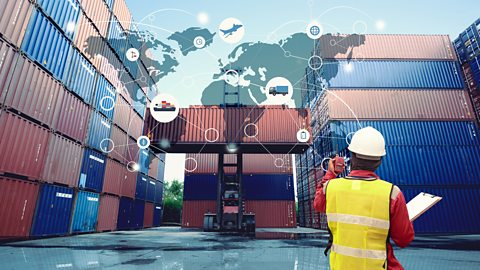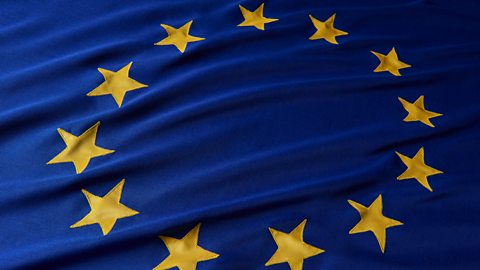Key facts about international business:
International trade: offers growth, risk spreading, and increased profits, but involves language, cultural, supply chain, currency, tax, and legal challenges.
Marketing mix: must adapt product, price, place, and promotion to local markets' needs and preferences.
EU single market: allows free movement of goods, services, capital, and labour, with no internal tariffs and common regulations.
EU membership impact: benefits include free trade and labour movement; challenges include regulatory compliance for businesses and stakeholders.
What is international trade?
International trade refers to the exchange of goods and services across international boundaries.
The amount of international trade conducted by firms has increased rapidly in the last 20 years. Indeed exports from Northern Ireland’s manufacturing sector are worth over £4 billion to the NI economy.

What are the advantages and disadvantages of international trade?
International trade has a range of advantages and disadvantages.
Advantages of international trade include:
Growth – expanding to new international markets allows businesses to grow more easily and quickly, either providing them with cheaper materials or access to more customers.
Spreading risk – if the business has operations in a number of international locations, risk is spread. For example, if the UK side of the business experiences a fall in demand, the European element of the business may grow. Similarly, if a business is able to source materials from a range of locations, they are less likely to be affected due to weather related production issues.
Increasing sales and profits – having access to cheaper materials or a larger amount of potential customers is likely to increase the chance of the business making more sales and profits.
Spreading technical knowledge – often different countries have individuals with different technical knowledge, experiences and expertise. International trade allows businesses to benefit from this.

Disadvantages of international trade include:
Language barriers – these can be a major issue, for example all packaging, advertising and branding may need to be accurately translated to other languages. If a business is buying or selling to another country, they may make errors if they are unable to communicate in the same language.
Cultural barriers – it is very important that businesses have a good understanding of different cultures when undertaking international trade.
Supply chain issues – as a business expands, its supply chain becomes longer and more complex. This provides more scope and opportunity for potential issues.
Currency issues – most countries use different currencies, and the values of currencies around the world change constantly. This can make it very difficult for a business to accurately predict and monitor finances.
Local taxes – each country has its own taxes and tax rates. Businesses operating in an international environment must pay each of these taxes, making finances more complex and expensive to manage.
Local laws – each country has their own laws that businesses must abide by. These can affect the way in which businesses operate, how they deal with consumers and how they deal with employees.
Chris and Julie talk about the impact of globalisation for their business
Chris: Hi, I'm Chris.
Julie: Hi, I'm Julie. You have an idea that you are going to make millions of pounds out of it. You've got to be very clear about what the market opportunity is, what the market potential is, what price you are selling at, and the road to profitability. The company might have to adjust the pricing accordingly if they are selling in a cheaper economy. Or you might need to regionalise some of the products so it's more fitting to that particular culture. If you work with lots of different countries, sometimes you have to work with lots of different currencies as well. Different countries will have different tariffs or import taxes or export taxes. You need to be very clear about what those taxes are to be able to work out the profitability of you buying and selling goods.
Julie: The tariffs can be different according to products. With our products, it's zero import duty, for example. In a global market, there is a much wider access to investment and a couple hundred more times more access to capital, but then you are also in a more competitive landscape as well.
Julie: When choosing a supplier, stability and scalability are the most important things, and that means, are they reliable, can they do things on time, can they scale and produce enough quantity of goods at the rate you need them. These days, ethical criteria are also very important as well. There are countries that have less strict policy in terms of labour, health, and safety, for example, so as a company to choose overseas suppliers, we have to be very careful.
Julie: E-commerce allows you to buy things anytime across the world, so even if we are here, you can still buy things online. It's a very quick way to get your products to people in other countries. Just because you get access to billions of consumers doesn't mean you'll be able to sell to billions of consumers. It's going to take a long time to build up that market awareness and penetration. Our new business will have zero percent of the market, and if it's a large market, then the market might be worth several billion pounds. You need to find where the hole in the market is, so identify where the gap is and come in with a product that fills the gap.
Chris: Bye, hope that helped.
Competing internationally – how does marketing mix change?
The marketing mix refers to product, price, place and promotion. When they are trying to compete on an international scale, businesses have to adapt their marketing mix. This is because different countries have different beliefs, income levels, and levels of demand for each type of product. These differences affect each element of the marketing mix.

Changes that a business might need to consider include:
product - styles, fashion trends, sizing, cultural beliefs (eg colours that are considered lucky in one country may be associated with danger in another), dietary requirements (eg some places may require halalAny action or thing which is permitted by Muslim law. orkosherThe word means fit or proper. Foods permitted by and prepared in accordance with Jewish dietary laws. foods) and infrastructure (eg right- or left-hand-drive cars and different types of electrical plug)
price - may be affected by tariffsA tax added to the cost of imports. and trading blocsA group of countries who have agreed to share trading agreements, and minimise barriers of trade between them., income levels and disposable incomeMoney available for spending and saving once taxes have been deducted., tax, exchange ratesThe value of one currency against another. and level of demand
place - access to the internet in certain countries, purchasing preferences in some countries (e-commerceThe buying and selling of goods and services online. may not yet be popular) and distribution links in certain countries
promotion - cultural and social differences, language and translations

Try the international marketing mix quiz
What is the European Union and the European single market?
The European Union (EU) is a group of countries from Europe that have an agreement in place for political and economic purposes. The EU has what is known as a single market, this allows for the free movement of goods, services, capital and labour.

The single market has a number of characteristics, these include:
free movement of goods, services, capital and labour
all of the countries within the EU can trade freely with each other, which means that no tariffs are put in place
goods and services traded within the EU tend to be cheaper than those traded with countries outside of the EU
there are general laws that affect businesses across the EU, examples include employment law and consumer protection
no barriers to trade across member states
tariffs on trading outside the EU
The impact of membership of the EU to businesses and stakeholders
Membership of the EU has a huge impact on businesses and stakeholders. Whilst there are a number of advantages, being part of the EU also provides some restrictions. Some of the main impacts to businesses of EU membership include:
free trade between member states
free movement of labour
regulations affecting businesses
Free trade between member states allows all businesses within the EU to buy and sell goods and services to each other with no additional taxes put in place by governments.
Free movement of labour allows any person that lives in an EU member state to freely move to other member countries to live or work.
There are a range of EU regulations that affect businesses. These pieces of legislation include laws that affect employee and consumers rights.
| Stakeholder | |
|---|---|
| Shareholders | • Shareholders benefit through increased profits. This is due to having a larger target market, being able to sell more products, and being able to source cheaper products and raw materials. • Shareholders are able to distribute employees in a way that will increase the success of their business. • Shareholders have to ensure that all EU laws are fully enforced throughout their business. |
| Customers | • Customers benefit from choice, as more businesses are able to operate here from around the EU. • Customers benefit from cheaper prices, they can purchase products easily from anywhere in the EU. • Customers benefit from consumer legislation, meaning they must be treated fairly by businesses. |
| Employees | • Employees have better job security, as businesses have more chance of surviving with larger target market. • Employees benefit from having the freedom to move around to a range of countries. • Employees benefit from employment legislation, meaning they must be treated fairly by businesses. |
| Suppliers | • Suppliers benefit through more potential customers. A supplier based in the France can receive tariff free orders from anywhere in the EU. • Suppliers may have to compete more on price, businesses have a large range of choice over which suppliers they use. |
| Government | • Governments benefit through more spending and foreign investment in a country. • Governments are likely to receive more in taxes; however, the EU also means that some businesses can move their money to different countries. |
Try the international business quiz
Final checks
What are some advantages of international trade for UK businesses?
Advantages include growth by accessing new markets, spreading risk, increasing sales and profits, and spreading technical knowledge across different countries.